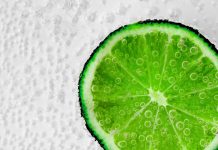
Vitamin C is the most easily destroyed vitamin there is. It is destroyed by oxygen, heat (above 70 degrees Fahrenheit) and it leaks out into the cooking water because it is a water-soluble vitamin. Vitamin C is more stable in baked foods as it won’t leak out into cooking water.
To preserve vitamin C in food, store citrus fruits, tomatoes, juices, broccoli, green peppers, cantaloupe, and strawberries in the refrigerator uncut until you need them. Prepare dishes with these foods right before serving. Also, cut these foods into larger pieces to prevent the air from destroying vitamin C. Cook these foods in as little water and as quickly as possible. Steaming and stir-frying are two methods that help conserve vitamin C content.
As long as the skin is uncut, the vitamin C is protected from air. If you store a cut fruit or vegetable or an open juice pitcher, cover it tightly with plastic and put it in the refrigerator.
Vitamin C dissolves in the cooking water, therefore, serve the food with the cooking water if possible. You can save the water from vegetables like potatoes and broccoli for making soup. Or mash potatoes with some of the potato water.
Also, cast iron pans destroy vitamin C. Don’t use them in cooking vitamin C-rich vegetables like tomatoes for spaghetti sauce.
Add vitamin C-rich foods to casseroles. As they cook, less vitamin C will be lost.
Vitamin C can be completely lost if foods are frozen for longer than two months. Keep your freezer at 0 to -10 degrees to minimize this vitamin C loss in juices and vegetables.
Orange juice is frequently bought as a frozen concentrate. Frozen, reconstituted orange juice has 78% and canned orange juice has 69% of the vitamin C found in fresh squeezed orange juice. Vitamin C is destroyed during the condensing process, but canning is even harder on vitamin C. It appears that fresh squeezed orange juice is better than either frozen concentrate or canned, but remember that the highest Recommended Dietary Allowances for vitamin C is 60 milligrams and all three forms, fresh, frozen and canned provide more than the RDA of vitamin C in 2/3 cup of orange juice.


